| Construction Rating: | starstarstarstarstar_border |
| Flight Rating: | starstarstar_borderstar_borderstar_border |
| Overall Rating: | starstarstar_borderstar_borderstar_border |
| Manufacturer: | Edmonds Aerospace |
| Skill Level: | 1 |
| Style: | Glider |
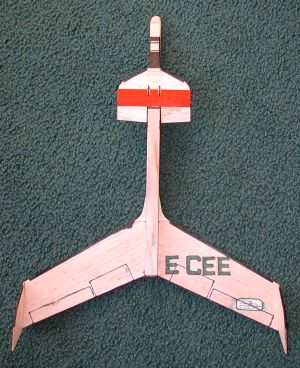
Brief:
The Edmonds Ecee is a balsa single stage 1/2A sized rocket boosted canard glider that uses variable geometry during
recovery glide.
Construction:
A plastic bag contains all laser cut balsa wood. The particular kit built for review had very lightweight wood.
Perhaps too light. More on that later.
Included in the kit are nicely laser cut parts, two sheets printed front and back of instructions, one body tube, tape for the elevator (canard) hinge, and a launch lug.
The four pages of instructions are great and easy to follow. Building the Ecee is a breeze. It took my six year old son and me less than an hour to finish. The fuselage is square and was a little tight around the body tube. Do not glue the round dowel into the body tube, as it must be free to slide in order to activate the canard elevators.
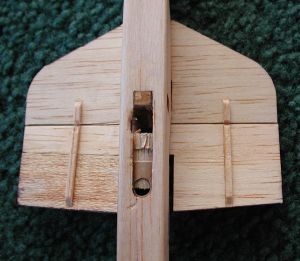 Once everything was together, it came out OK. I had to use a little plastic modeler's clamp to hold the fuselage while
gluing. Also I used some 90 degree steel blocks to support the fins while gluing. Make sure you get the ejection charge
exhaust hole pointed downward and toward the front of the fuselage, It needs to line up with the 1/4 inch slot in the
bottom. This kit seems a little flimsy since the balsa is so soft.
Once everything was together, it came out OK. I had to use a little plastic modeler's clamp to hold the fuselage while
gluing. Also I used some 90 degree steel blocks to support the fins while gluing. Make sure you get the ejection charge
exhaust hole pointed downward and toward the front of the fuselage, It needs to line up with the 1/4 inch slot in the
bottom. This kit seems a little flimsy since the balsa is so soft.
The only tools required were a bottle of white glue, a sanding stick with some fine sandpaper on it, and a hobby knife. I used some CA glue on some parts. The finished rocket does come out light.
Finishing:
Rocket gliders need to be light. Conventional finishing with normal paint will add a lot of weight. For this reason,
trim markings were added to wings and fuselage with Sharpie Magic markers.
There are no decals included in the kit. The Ecee looks very cool when finished as it has a nice full fuselage and canard wing design that are attractive and aerodynamic looking.
Construction Rating: 4 out of 5
Flight:
The recommended motors are 13mm 1/2A3-2T and A3-4T. For the initial test launch, we chose an Estes A3-4T. To prepare
the glider for boost, a pencil must be used to push the canard elevator actuator to the aft position. The ejection
charge pressurizes the internal body tube and pushes the little balsa dowel actuator against the elevator control horn
to make it deflect downward approximately 15 degrees. In theory, you should get a straight boost then a nice glide. The
model should be hand flight tested with the elevator deflected full down and a spent engine case in.
Test glides were great. A tiny bit of clay was added to the rear of the fuselage for good balance.
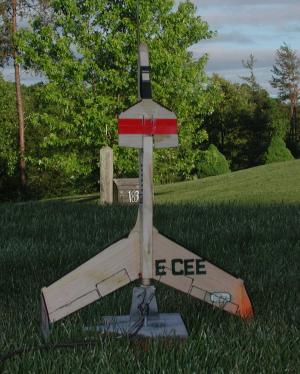
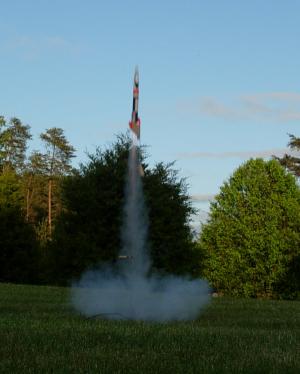
The motor is held in place by clear tape. A wrap of tape is put around the motor where it fits into the body tube and a little more on the outside of the case where it sticks out, to prevent it from pushing up into the tube during launch. There is no motor stop ring in the kit. No recovery wadding is needed for the Ecee
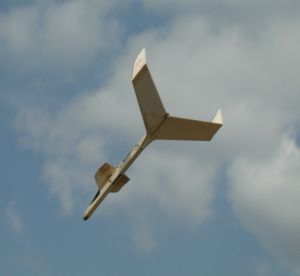
The very first flight was a scary disaster! Just 15 feet above the launch pad, the Ecee's left main wing separated right in the middle! The vehicle veered over 90 degrees in a rapid series of fiery smoking tumbles and gyrations. We dove for cover as the model tumbled around the sky until the engine finally ejected. What was left of the wreckage then tumbled to the ground. On closer inspection it was discovered that in addition to the broken wing, the elevator had broken off at the hinge line.
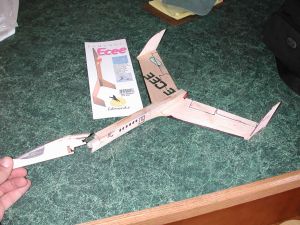 Recovery:
Recovery:
There is no shock cord on the Ecee. Preparing the glider for launch is conventional. The recovery was disappointing
to say the least as this thing had flown so nicely in all the test glides. The damaged wing and elevator should be
relatively easy to repair, and we will return to flight in a day or two.
On the second flight, the wing held together nicely but boost was a bad arch right into the ground. The fuselage broke in two just behind the canard.
Flight Rating: 2 out of 5
Summary:
We really liked the way this kit looked when it was finished. The ease of assembly is a real bonus. The glide of the
Ecee is very realistic and majestic. That is why it was such a disappointment when it shredded on the very first
launch. The wings could be a little denser grade of balsa. We had to add tail weight anyway so this wouldn't be a
problem with overall weight.
Overall Rating: 2 out of 5
Other Reviews
- Edmonds Aerospace Ecee By Alan Rognlie
- by Moira Jean Whitlock Brief description: This is an all balsa wood glider that flies up like a rocket and is recovered when it glides down like an airplane. Pros and cons of construction: The parts are all there, secure within a plastic bag, Nothing was broken or defective. The fuselage of the model is panels of die cut plywood, as are the wings and canard. The motor tube is spiral ...
- Edmonds Aerospace Ecee By Alan Rognlie
( Contributed - by Alan Rognlie) After my good experience with Edmonds Deltie , I decided to try this model from Rob Edmonds. I ordered it from Apogee Components (along with a second Deltie, a plan set for a Nike Hercules and a couple of his technical reports) and it arrived within 4-5 days. This kit builds to a nice mini-motor (13mm) rocket glider - i.e. no parts are dropped ...
 |
 |
Flights
 |
 |
G.A.D. (June 25, 2002)
J.R.R. (September 23, 2002)
D.B. (February 18, 2007)
 |
 |
K.W. (September 1, 1999)